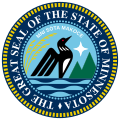| |||||||||||||||||
| |||||||||||||||||
| |||||||||||||||||
The 1861 Minnesota Secretary of State election was held on November 5, 1861, in order to elect the Secretary of State of Minnesota. Republican nominee and incumbent Secretary of State James H. Baker defeated Democratic nominee Daniel Buck. [1]
| |||||||||||||||||
| |||||||||||||||||
| |||||||||||||||||
| Elections in Minnesota |
|---|
 |
The 1861 Minnesota Secretary of State election was held on November 5, 1861, in order to elect the Secretary of State of Minnesota. Republican nominee and incumbent Secretary of State James H. Baker defeated Democratic nominee Daniel Buck. [1]
On election day, November 5, 1861, Republican nominee James H. Baker won re-election by a margin of 5,446 votes against his opponent Democratic nominee Daniel Buck, thereby retaining Republican control over the office of Secretary of State. Baker was sworn in for his second term on January 2, 1862. [2]
| Party | Candidate | Votes | % | |
|---|---|---|---|---|
| Republican | James H. Baker (incumbent) | 16,035 | 60.22 | |
| Democratic | Daniel Buck | 10,589 | 39.77 | |
| Write-in | 5 | 0.01 | ||
| Total votes | 26,629 | 100.00 | ||
| Republican hold | ||||